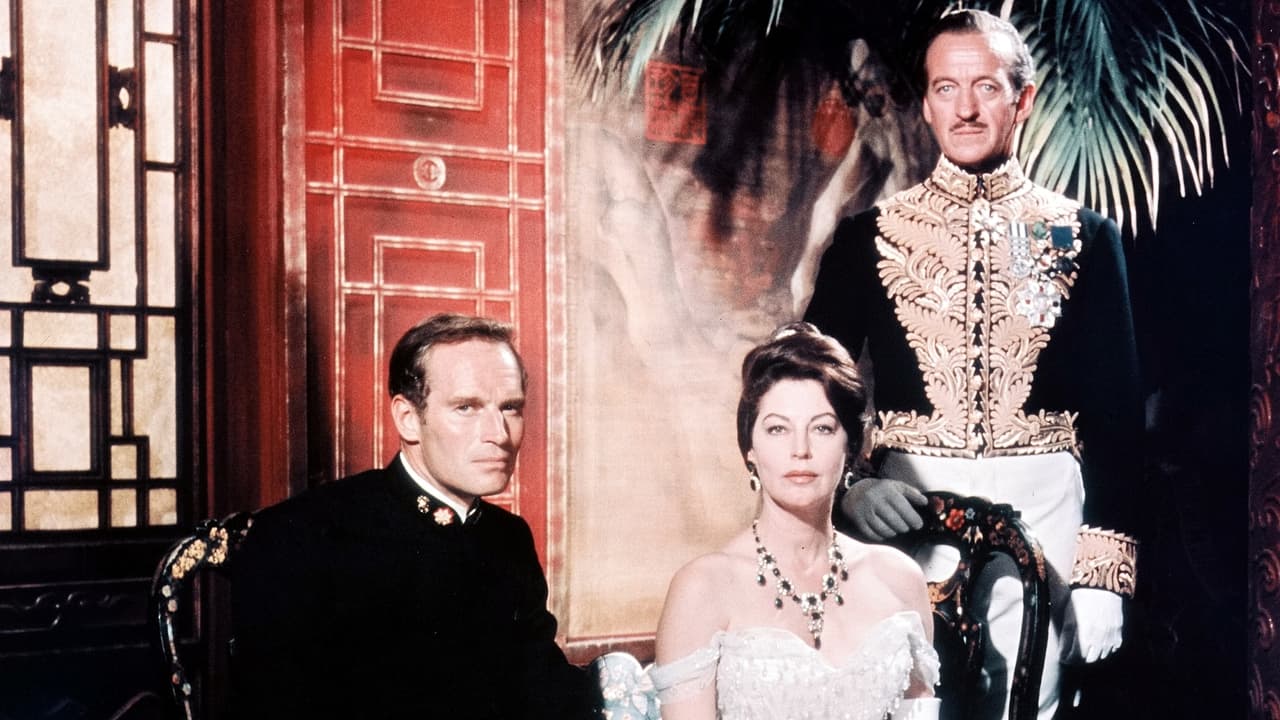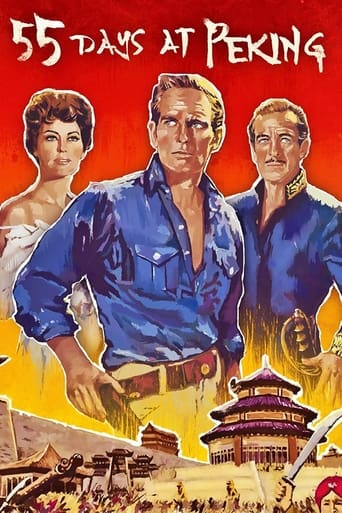

I think this is a new genre that they're all sort of working their way through it and haven't got all the kinks worked out yet but it's a genre that works for me.
... View MoreSurprisingly incoherent and boring
... View MoreFunny, strange, confrontational and subversive, this is one of the most interesting experiences you'll have at the cinema this year.
... View MoreVery good movie overall, highly recommended. Most of the negative reviews don't have any merit and are all pollitically based. Give this movie a chance at least, and it might give you a different perspective.
... View MoreBut what is not usually gone into is the other side of the coin. China was not well governed for the bulk of the population. In fact, in the 1850s and 1860s there was a long and bloody Civil War (The Taiping Rebellion) that was to make an international figure out of the British General who finally put it down (Charles George "Chinese" Gordon). The reason for the rebellion was partly religious, but it was also partly economic - the peasantry was tired supporting the Manchu Court in Beijing (the Peking of the movie title). A succession of weak emperors were plaguing the country, who were manipulated by Tzu - Hsi (one of the most unscrupulous monarchs in history). Tzu - Hsi would basically control the Chinese Government from 1860 to 1908, when she died. Her idea of government responsibility is illustrated by a famous act of selfishness she performed. When China's navy was trounced in the Sino - Japanese War of 1894 (Japan had a modern navy), it was decided to use tax money to build up the Chinese navy to compete with Japan again. The Dowager Empress agreed - she took the money earmarked for battleships, and built a super battleship. Only it was made of marble, in the shape of a battleship, and was put on land as a summer palace. It is still standing as a tourist attraction.Humiliations were not only done by Europeans, Americans, and Japanese. If you recall the geography lesson scene in THE KING AND I, the children are unconvinced about the small size of Siam as opposed to China. The Crown Prince points out that China can't be that big - it's monarchy is considered weak, while Siam's is strong. Well, in this period, Siam (Thailand) also had managed to get some territory back from China - and to become rather important in the area of southeast Asia. This would not have been the case in the 17th or 18th Centuries.In 1900 the Chinese finally exploded. The people had been forming para- military groups in the late 1890s (in the wake of the defeat by Japan) which were ultra-Nationalist, fervently anti-foreign, and fervently in favor of Chinese religious beliefs over Christian. The Dowager Empress realized that it would be advantageous to her to let these energies be expanded towards the foreigners: it would keep these people looking too closely at her misrule. Without officially countenancing these groups (called "Boxers" because their translated
... View MoreHistorical and monumental film with big budget financed by the great producer Samuel Bronston . In this grand picture there are struggles , epic events , a love history and results to be very interesting , in spite of the fact that the runtime is overlong : 154 min and was filmed in Technicolor and Technirama . And including colorful photography and Dimitri Tiomkin's fascinating as well as romantic musical score , being masterfully directed by Nicholas Ray . During the 1900 Boxer Rebellion (Pekin , now Beijing) against foreigners in China, U.S. Army Major Matt Lewis (Charlton Heston), the head of the American garrison , aided by British Consul Sir Arthur Robertson (David Niven) , devises a strategy to keep the rebels at bay until an international military relief force arrives . The Boxers receive a tacit and undercover support by the ruler , Dowager Empress of China Tzu-Hsi (Flora Robson) , and her favorites as Prince Tuan (Robert Helpmann) . Meanwhile , Matt falls in love for a beautiful Baroness, Natalie Ivanoff (Ava Gardner) . Then , Matt Lewis (this role was loosely based on the real-life officer in charge of the marine guard at the US Legation, then Captain, later Lieutenant General, John Twiggs Myers) sets the forefront of some of the toughest fighting in the besieged legations . As a handful of men and women held out against the frenzied hordes of bloodthirsty fanatics and caught in the midst of the mayhem . All of them try to stop them pending the arrival of a relief force. The movie is very spectacular , it's an excellent film , partially based on historical deeds . Runtime picture is overlong but is neither boring , nor tiring , but entertaining because happen many events . In the film, there are epic , mammoth spectacle , history , a love story , wonderful scenarios and is a pretty enjoyable movie . The final confrontation battle between the military Britishers , American soldiers , other foreigners and the Boxers enemies is overwhelming and outstanding . Nice performances by big name actors , an all-star cast . And extraordinary support cast such as John Ireland , Harry Andrews , Leo Genn , Kurt Kasznar , Philippe Leroy , Paul Lukas , Elizabeth Sellars , Massimo Serato ,Eric Pohlmann , Robert Urquhart , Burt Kwouk , Mervyn Johns , Jacques Sernas , among others . And brief interpretations from Spanish cast as Carlos Casaravilla , Jose Nieto , Félix Dafauce , Alfredo Mayo , Conchita Montes , Fernando Sancho and ¡Paul Naschy¡ . Lavishly produced by Samuel Bronston , as he constructed a set representing turn-of-the-century Peking in Madrid at a cost of $900,000 . When Bronston was making the set for the Forum Romanum from ¨The fall of the Roman Empire¨ and it was actually being built , then Heston rejected the script but expressed an interest in '55 Days at Peking' instead . Bronston immediately ordered that the work on the Forum be stopped and the landscaping and foundation work be adapted for the Peking set . After filming, the Peking set was torn down and replaced by the Forum , if you look carefully, both sets share a very similar topography . Veniero Colosanti and John Moore production as well as costume design are breathtaking and impressive . Battles well staged are incredible and overwhelming . Due to mainland China's hostility and isolation from the Western world, a full-scale 60-acre replication of Peking 1900 -sewers and all- was built in the plains outside Madrid, and Chinese/Asian extras were flown in from all over Europe to provide the local Peking citizenry . The production grew so strapped for extras and equipment they borrowed them from Lawrence of Arabia (1962), which was filming concurrently in Almeria and Seville . A number of costumes for the Royal Chinese Court were authentic ones from Tzu Hsi's actual court . Evocative as well as rousing musical score by the classic Dimitri Tiomkin . Ray direction is splendid and Jack Hildyard -David lean's ordinary cameraman- cinematography in Super Technirama 70 is fascinating . The flick was superbly handled by Nicholas Ray . However ,the production was troubled almost from the beginning. It ran into financial troubles, there were conflicts among the cast, and director Nicholas Ray argued so violently with producer Samuel Bronston that he eventually walked off the set and quit the picture, and soon afterward suffered a severe heart attack. Andrew Marton and Guy Green finished directing the picture, uncredited . The motion picture will appeal to historic story buffs and spectacular film lovers .
... View MoreIt's the summer of 1900 Peking. The Boxer Rellion explodes attacking foreigners and Christians. The Dowager Empress Tzu-Hsi tries to harness the Boxers against the foreigners as differing voices in court argue. China veteran Maj. Matt Lewis (Charlton Heston) leads his US forces into the city. He tries to buy a British missionary captive from the Boxers but he's already dead. Sir Arthur Robinson (David Niven) leads the British mission trying to keep the peace. Lewis becomes romantically involved with Russian Baroness Natalie Ivanoff (Ava Gardner). Prince Tuan orders the murder of the German minister by the Boxers witnessed by Lewis. The Dowager 'advises' the foreign legations to leave Peking within 24 hours.The politics is a bit simplified. Charlton Heston is impossibly gallant and uncomfortably stiff as the romantic lead. Ava Gardner has the unenviable task of batting googly eyes at him. David Niven does the stiff upper lip very well. He's the superior actor in this one. The main Chinese characters are all played by white actors. It's a missed opportunity but business as usual for Hollywood of that era. The extras are mostly Asians which is an effort considering the filming location is Spain. The sets are impressive. The battles are compelling big actions with lots of Chinese killed as well as the prerequisite foreigners. This is an old fashion war epic with as much racial sensitivity as can be expected.
... View MoreWonderful action epic from 1963 starring Charlton Heston and Ava Gardner and the cast of thousands as they say.Based on a real siege during the"Boxer rebellion"from 1899 to 1901 in which China attempted to force the occupying Imperialist powers out,its a stirring action film that takes great pains not to politicize the time or pass judgement.Rather the film tells the classic old chestnut of love and loss set against the backdrop of war.What makes the film relevant today is the mere mention of historical events that seem long forgotten but shouldn't be.How many youngsters even know Beijing was once known as Peking or that the US had a presence there so many years ago?? Now at that larger than life actor Heston,and well sit back and enjoy.The only flaw is the old Hollywood prejudice against casting Asian's actors in leading roles.A film about China without Asian actors in key roles is laughable at times.
... View More